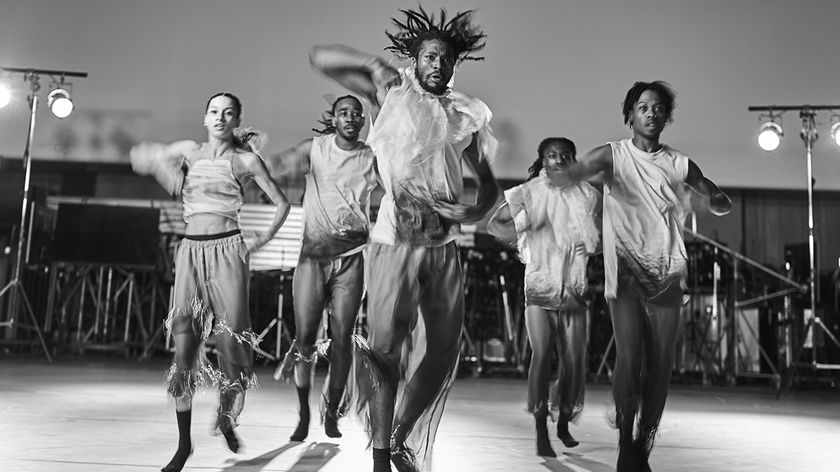"Sting didn't write no film score": drum legend Stewart Copeland on his Police Deranged for Orchestra tour
Copeland is bringing his orchestral interpretations of The Police's hits to the UK for the first time in April 2023
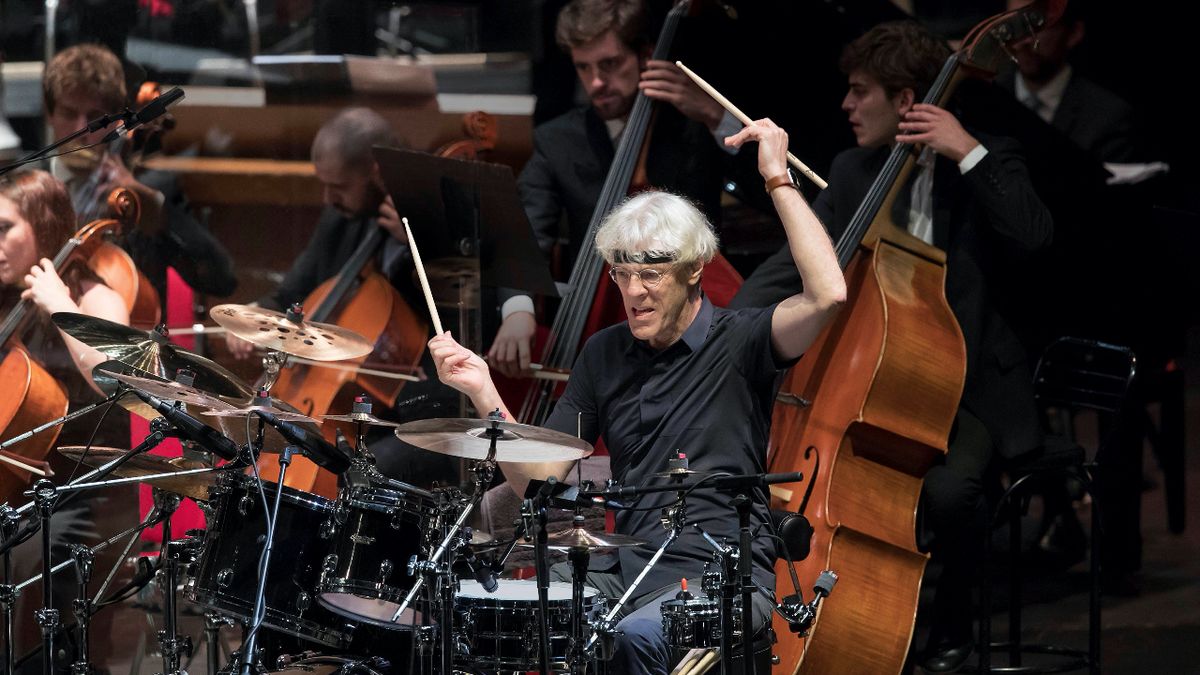
“This is going online? So I can say f**k, s**t, c**t, p**s?!” It’s 9:30am for Stewart Copeland as we start our phone conversation, and while he observes that it’s the start of a rare, cloudy Californian day, he’s clearly in a bright mood. This is the same energised Copeland we’ve watched thousands of times, bouncing around, drumming on whatever surface is available to him in Police videos. But familiarity aside, he’s joining us to talk about something quite different: The Police Deranged for Orchestra.
Stewart’s latest project sees him merge the music of The Police with his love of orchestral music - fostered over decades of composing and arranging film, TV and video game scores - to create reimagined versions of some of The Police’s biggest hits.
He’ll be bringing the live show (complete with an orchestra and full live band) to the UK for the first time in April 2023, before returning to Europe in July for two dates in Germany and six in Italy.
The dates give fans of The Police, and crucially, Stewart’s drumming, the opportunity to see the man himself back behind the drums playing some of the most iconic drum parts of the last 40 years.
So how does a frenetic, pioneering rock ’n’ roll drummer end up in the world of rosin and valves? We spoke to Stewart to find out.
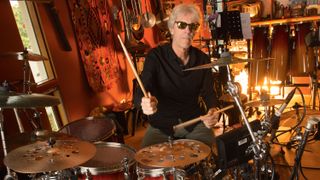
You're bringing The Police Deranged For Orchestra to the UK for the first time, but how did the concept for the whole project come about?
"Well, in several stages. One is that I was a film composer for 20 years, and therefore received an involuntary education in what to do with orchestras, how cool they can be, how wide their vocabulary is, and how much fun it is to create stuff for them.
Get the MusicRadar Newsletter
Want all the hottest music and gear news, reviews, deals, features and more, direct to your inbox? Sign up here.
"Then I retired from that, but I was playing concerts. You know, we'd get commissions from, say, the Pittsburgh Symphony to do a concerto for drums and orchestra, or, the Royal Opera House to write an opera for Covent Garden, or, you know, just orchestral music of various different kinds.
"I've gotten kind of immersed in that, and I've been doing shows of my film scores and so on around America and Europe. At one point, I did do some Police songs that I'd written - Miss Gradenko, and others.
"I just did orchestral arrangements and audiences really responded to them. One time I thought, ‘Well, screw it, let me actually try an orchestral version of one of the hits.’ I did Don't Stand So Close To Me, instrumental, and you could feel what I already knew, which is that familiar songs just have more dramatic impact than new material."
"A song that people have sung-along to, that they fell in love to, they live their life with that song as part of the soundtrack. Having emotional baggage is really great to exploit in a concert environment. If you want to burn down the building, play 'em a song they all know.
"Every band knows this, from touring their new album that they're so proud of - the new songs just don't go down as well as all their older songs until the end of the tour when everybody's got the album and heard it on the radio, and it's become familiar.
"So that familiarity aspect is quite profound, and since, you know, I do shows to burn down the building, that's what I like to do! The idea of actually digging deeper into The Police seemed like a good idea, and, as has been proved by maybe 20 shows by now, around America and Europe, it really does light up audiences.
"People really do like hearing fucked up versions of Roxanne and Message In A Bottle and Can't Stand Losing You. In an orchestral setting it's very different, but you get to hear the song. I have three soul sisters on the mic, which gives me three vocals to work with so I can do a lot of the cool harmonies and then some, to stretch these familiar songs into new shapes."
The Police’s music is incredibly well written, did this help when it came to transitioning the music for orchestral arrangements?
"Is it good or bad? That's easy, how to do it and make it work on stage is challenging. But there was another intermediary step, which was that I made a film [Everyone Stares] out of all my Super 8 footage that I shot way back in the day. And I shot it and forgot about it, because whenever you look at Super 8 footage using a cranky old Super 8 projector, you scratch it every time and you can't really edit it because you know…long story.
"So I put it in the shoebox and forgot about it. Then one day, they invented computers, and all of a sudden I could digitise all that stuff and, click bang, what the hang…I've got a movie. I could cut this kind of home movie from hell [Everyone Stares: The Police Inside-Out].
"Just on a whim, I sent it to Sundance and they said, 'Come on down'. So I, you know, appeared at Sundance and a shitstorm occurred. And there was a lot of interest in it went out and eventually it was a movie.
"To make that movie, I needed Police music, of course. But as a film composer, I had to make the music suit the film, which you know, Sting didn't write no film score. Roxanne is not a piece of film score.
"So I had to get out the scalpel and cut it up to make it serve the movie.When the movie takes a left, the music takes a left. Once I got the scalpel out and started carving up these tunes, the orgy began.
"I got out multitracks, I got out live recordings, and found all kinds of other material either from improvisations on stage, or other guitar solos from the studio, and I found all this other inspiration. So the part that was easy, was the inspiration part. The material is already very inspiring. But to get all this other material, it was hard to know what to use and not use.
"Creating the scores is a piece of desk work. It’s very meticulous. You have to do it all at home, imagining it all in your head, because it's very different from making music come out of speakers.
"When you record a band, and it comes out of the speakers and you tweak it till it sounds great. But when you're making music on the page and there's no band, just in your head, imagining what the orchestra is gonna sound like, ‘If I give this line to the flutes and the oboes, how's that gonna sound? Or should I feather in some clarinet?’"
"Those kinds of decisions about creating the texture, you're only hearing it in your head, and ‘in your head’ is guided by the last time you were in a soundstage with an orchestra, and that's what it sounded like when I had the flute and the oboe and the clarinet combined in such a way.
"It's a lot more mental work to create a score than to create a recording, because other human beings are gonna have to take those dots on the page and play it. You don't know whether it's going to work until first rehearsal and one thing orcs don't do is experimentation and exploration. So you need to have done your homework before you get there."
The set contains some of The Police’s biggest hits. Were there any songs that were more of a challenge to fit the orchestral arrangements?
"Well, there were songs that were more challenging to ‘derange’. Message In A Bottle is like a diamond. It withstood every effort of mine to turn it upside down, inside out, but it just was impervious to all of my attacks! And it's pretty, you know, so I didn't derange all the songs.
"Some of them are the same form, of course, different textures; the guitar player is doing something different, the orchestra is picking up on what was the guitar part and so on. But some songs are barely recognisable, and some songs are very recognisable.
You’ve mentioned before about watching drummers attempting to play your studio parts that contained overdubs, which essentially make them impossible with four limbs. Did you have to change your approach to the parts you’re playing on these versions?
"Yeah, good question. You would think so. But I've never really been bothered about that. In fact, none of the three Policers ever worried about, 'Well, how are we going to do this on stage?'. Andy would have had much more of a problem because of the the variety of textures that he brought to the recording studio and put on the record.
"There's no way one guy could play all that. But one thing that has never been a problem is Andy blowing people away with just him and two hands and one guitar. Even though on the record there's all this other stuff. All he needs is two hands and a guitar and an amp and Andy's got it covered.
"We always had a very cavalier attitude towards how we will eventually play such songs on stage because it seems to work. We just get out there and play what we play and nobody seems to mind that there's that guitar harmony missing type of thing.
"By the way, you asked about Message In A Bottle and the overdub parts. Well, hey, in my orchestra, I have two percussionists. So we are fully covered in the banging and clattering department!"
Have you found that playing with the orchestra means having to dial-back your drumming at all?
"Yes, and no. It’s more of a volume thing. The drum set is designed… it's kind of an arms race with the amplification. As the amps get bigger, the drums have to be louder, and they're designed to be very, very loud to compete with giant amplifiers on either side.
"Now, this isn't true of those funny little wooden instruments of the orchestra. So there's a volume problem. One crack of my snare drum can blow the whole orchestra away, even though I'm hugely outnumbered. So I've had to adjust my volume.
"But there have been a few benefits of that, which is that all of the nuance and technique that I studied as a kid, and has always been there, and for which there is no room and rock and roll now has great relevance in this much quieter orchestral setting.
"So the vocabulary of my instrument is much wider and the sound of the drums when I'm not killing them is much more beautiful. I caress them with love, instead of aggressing upon them with homicidal intent. Further, with the orchestra, even though the volume is less, the drama is more.
"When you sit in the concert hall, watching a big orchestra, you're not even aware that it's not loud. But you are aware of the huge dramatic impact, the sonority the richness, it's powerful in 10 other ways that aren't reliant on volume.
"So even though the volume is less, the power, the majesty is greater. And nobody gets a headache!"
So fans of your drumming are in for a treat?
"Oh, they're gonna get all kinds of cool shit. Because there's room for it. Because you can hear it and because I'm not killing it [with volume] there's much more finesse. I think drum fans are going to be well satisfied with this version."
Has the orchestra changed your gear approach?
"Yeah, slightly. The drums are the same. My cymbals are much lighter. They invented cymbals with holes in them, they look like Swiss cheese. Swiss cymbals [Paiste]…well, in fact, they are made in Switzerland.
"A regular rock 'n' roll crash cymbal will obliterate the next four bars of symphony. So the ones that I have decay very quickly. Which is all I need, I just need that punch and then I'd like them to go away, because my brass section are holding that note.
"So the cymbals are much quieter, they're lighter and not as loud, not as much metal vibrating. I also hit them differently. I hit them on top- I go 'ting', rather than on the edge, which goes 'crash'. So the cymbals are the main problem for orchestra.
"Tom-toms, I just play them more delicately and with more finesse, and everything's fine, but you hit that cymbal - you actually need different cymbals to work with an orchestral environment."
You’re well-known for playing traditional grip with a lot of power, has using that grip assisted in keeping things quieter for this?
“The whole business of traditional versus matched grip brings a smile. Because the young players are weirdly in awe of it. And for some reason, they attach some kind of credibility to orthodox grip.
"In fact, when I'm conducting the orchestra, I conduct with the wrong hand, with my left hand holding a drum stick in orthodox grip, which always gets a laugh!
“But no, I don't think it makes it…Orthodox grip has a historical function which was for the snare drum as a marching instrument, marching along with the soldiers. Hitting a snare drum, if it's sitting straight up, your knees are going to bounce into it, and it’s hard to march.
“So that's why they turn it on an angle so that your legs have room to move under. Well, what that does is it brings the rim of the drum way high, and to play matched grip means your elbow’s going to be up in the air, trying to play this drum that's at an angle. So they flip your hand around, and thus is the orthodox grip.
“Then jazz drummers when they were sitting on a traps kit and not marching, they still had that grip. So the jazz drummer has their snare drum tilted down on the right up on the left.
“That orthodox grip is well suited to that drum position. Matched grip players tend to have their snare drum absolutely horizontal. In fact, it reminds me of the old drummer joke: How do you know when the drum riser is absolutely horizontal? The drool will come out of both sides of the drummer's mouth!”
How about the snare tuning, is it still cranked in this context?
“Yeah, it's still very high. The other thing about the high snare drum, is that it's much more responsive. And the bounce the drags the ruffs all work better. It has more clarity than a fat back.”
Finally, if you had to sum it up, what can what can Police and Stewart Copeland fans expect form a Police Deranged show?
“Singing and dancing! We're all going to take our clothes off and run around the hall! I guess…they’re really great songs, and that's the first ingredient that you need. But the orchestral colours are interesting, and hopefully you will get that same nostalgic emotional response, but also be delighted by new instrumental textures. And I will be there, faithfully banging shit!”
Stewart Copeland’s Police Deranged for Orchestra Tour comes to the London Coliseum, Friday 28th April 2023. For tickets please visit Ticketmaster.co.uk

I'm a freelance member of the MusicRadar team, specialising in drum news, interviews and reviews. I formerly edited Rhythm and Total Guitar here in the UK and have been playing drums for more than 25 years (my arms are very tired). When I'm not working on the site, I can be found on my electronic kit at home, or gigging and depping in function bands and the odd original project.
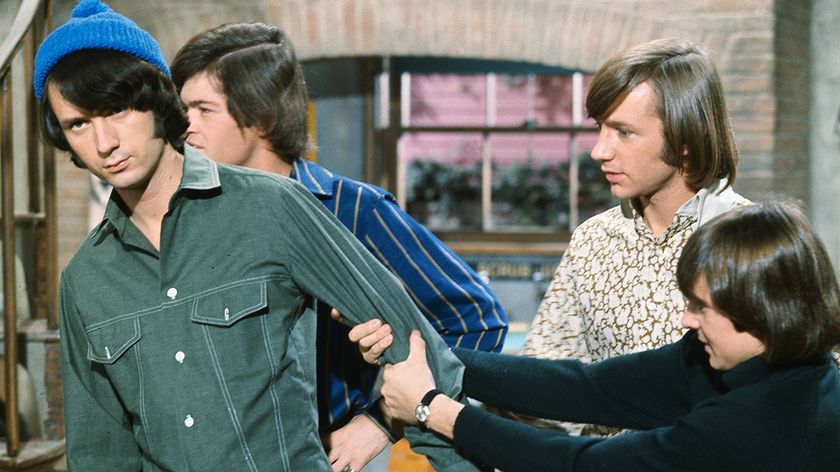
"They said, ‘Thank you, but no thank you - it’s not a Monkees song.’ He said, ‘Wait a minute, I am one of the Monkees! What are you talking about?’": Micky Dolenz explains Mike Nesmith's "frustration" at being in The Monkees
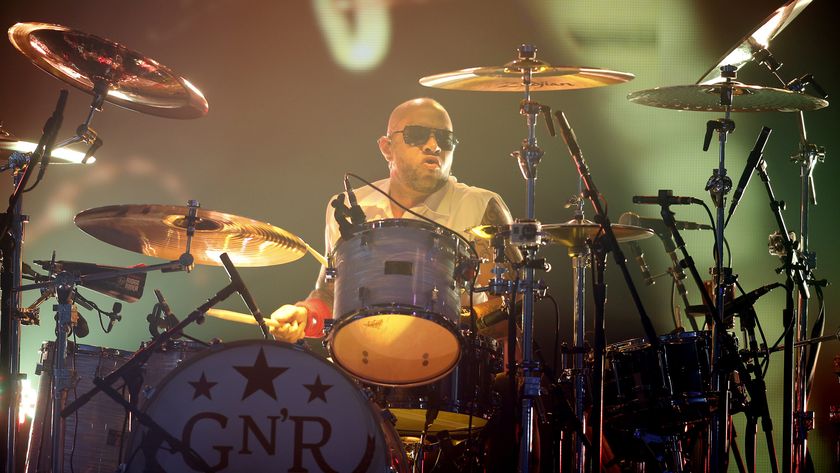
“There’s nights where I think, ‘If we don’t get to Paradise City soon I’m going to pass out!’”: How drummer Frank Ferrer powered Guns N’ Roses for 19 years










